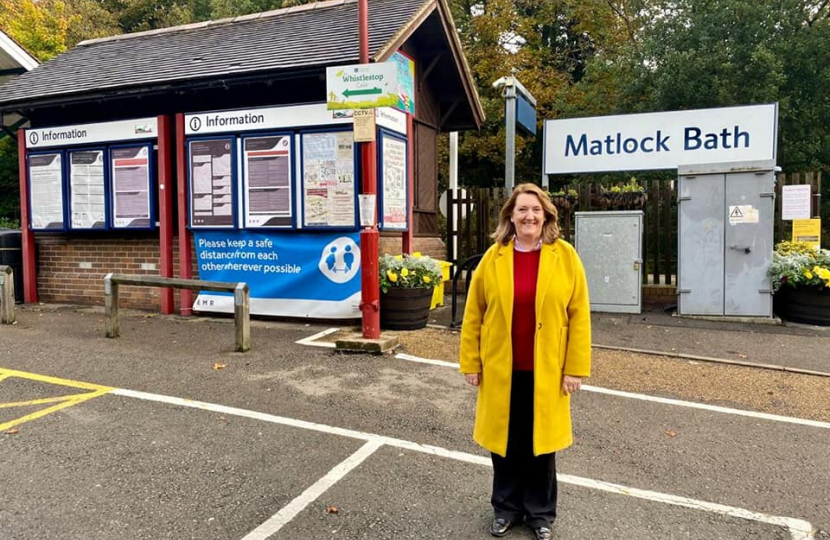
Our national rail network should be a source of great pride for our country, its comprehensive coverage, development, and significant usage. As a country we take roughly 1.7 billion journeys a year, which is a testament to the longstanding excellence of British engineering. From the rail boom of the 1840s, to the delivery of highspeed rail, the Channel Tunnel and the Elizabeth Line – Britain has been at the forefront of rail delivery, however, it is crucial that further progress is made to ensure our rail network, both here in Derbyshire, and nationally, is fit for a new industrial age.
Derbyshire Dales sits at the heart of Britain’s rail story, one of the country’s very first passenger lines opened here in May 1840 with the completion of the Ambergate to Derby section of The Midland Railway’s Derby to Manchester route. Track would be laid down along the Derwent to connect Ambergate with Rowsley in 1849, and then onto Buxton in 1862 creating the Monsal Trail. The railway has a permanent legacy in so many our towns, whether that be in the form of the still in operation Matlock to Derby route, the heritage Peak Rail service, or even the beautiful Monsal Trail with its aqueducts, cuttings and breath-taking views. The Peak District was home to Britain’s most picturesque railway, an example of British innovation and facilitated a new wave of Victorian visitors to the communities we still cherish today. The county also owns a rich rail history as the birthplace and home of locomotive manufacture for over 150 years, which is one of the reasons why I campaigned enthusiastically for Derby’s bid to become the location for the planned Great British Railways headquarters.
The importance of our railways is quickly increasing in recent years, and it is a priority for me that constituents in Derbyshire Dales have access to the very best services, whether that is enjoying good connectivity between Sheffield and Manchester in the North, or Derby and Nottingham in the East. Furthermore, I know many constituents make use of our national mainlines, especially the Midland Mainline serviced by EMR to get to London and I know how frustrating recent months have been for passengers who have often had to deal with unreliable strike-affected services.
By 2030 a shift away from fossil fuel driven cars, lorries and buses will be in full effect, and it is clear to me that our rail network should be an obvious environmentally prudent alternative method of transport. I have seen the effect first-hand of plagues of cars descending on the Peak District during the warmer months of June, July and August, clogging up our roads both physically and contributing to the air pollution in our towns. Derbyshire Dales is generally not a densely populated area, and our road infrastructure was not designed to cater for the influx of cars we see today. It would be great if we could have more regular services that brought visitors to us, reliable services that allowed locals to commute to Derby, Nottingham or Sheffield, and one that instilled confidence that a car is not needed to visit the Dales.
This is why I have been working so hard in recent months to ensure EMR, the Department for Transport and my colleague the Minister for Rail Huw Merriman MP are aware of the importance of our rail links here in the Dales. I am meeting with EMR this week to discuss how they can offer better connectivity to the stations between Matlock and Derby as well as Hathersage and Grindleford on the Hope Valley Line; I know residents have waited patiently for the full reinstatement of services between Matlock, Derby and Nottingham which are so vital. Notwithstanding the effect reduced services have on our businesses that rely on tourism and leisure, a lack of flexible timetables also affects commuters. I know from my work as both formerly a barrister and your Member of Parliament that not everyone works 9-5 and would use peak services, so having the security of around the clock trains gives reassurance that you can work atypical hours and still get the train home.
More broadly our rail network needs significant upgrades to ensure it is fit for purpose in the coming decades. National connectivity boosts productivity and helps us achieve our environmental targets, but currently, elements of our railways still resemble their Victorian-era foundations. Far too many times I have experienced delays or cancellations due to signal or other equipment failures, delayed trains due to driver or crew shortages, or trains arriving without the allotted number of carriages. I have no doubt you will have your own similar anecdotes to share. For instance, I find it perplexing that many train operators are forced to pay overtime to drivers for working on Sundays and weekend services on the West Coast Mainline ground to a halt when a pay dispute encouraged unions to request their members not take up Sunday shift options. Our railway is a seven days a week service, and contracts should reflect this modern reality. Similarly, there have been conversations regarding the complex subject of using technology to reduce the need for teams of engineers, who are each restricted in the locations they can work, to be dispatched to carry out routine operations. Although I do not profess to be an expert in this topic, union leaders have admitted there is a role for improved technology on the railway, and it is important that a resolution to the dispute between train companies and Network Rail and the unions can be found soon.
I know there have been criticisms levelled at the Government regarding the rail strikes, however, ultimately this dispute is primarily between the train operator and Network Rail and their staff. However, with passenger numbers not yet back at pre-pandemic levels any pay rises for rail staff in line with their demand for backdated inflation-matching pay would likely need to be funded by the taxpayer. Furthermore, it is important for constituencies such as Derbyshire Dales that train companies have the financial means to run services such as Matlock to Derby which may not be as profitable as mainline routes. It would not be in the Dales' interest for further services to be cut due to financial pressures imposed by the unions on train operators. Network Rail and the train companies have both made offers of a pay rise to rail workers demonstrating that the unions’ assertion that pay has been frozen is misleading. The offers are a step towards the modern, reliable and resilient railway the Government wants to deliver which grows revenue and puts the industry on a sustainable financial footing. However, further pay rises can only be afforded if the industry modernises and reforms outdated working practices.
It is also important to remember the context of Government support for the railway industry during the pandemic with over £30 billion – equivalent to £1000 for every household in the UK invested to keep trains running and ensure that rail workers continued receiving their salaries. I know the Transport Secretary has been working to facilitate fresh dialogue between the rail companies and unions and I do genuinely hope the Rail Delivery Group and unions will settle soon – I will of course encourage my colleagues to be as constructive as possible.
Finally, I am looking forward to welcoming my colleague Huw Merriman MP to the constituency this year and I expect we will visit the improvement works planned on the Hope Valley Line at Hathersage. I understand capacity is to be increased with a passing lane instituted at Bamford, and I will promote both our stations on this line – Hathersage and Grindleford for more regular services between Manchester and Sheffield. I will continue to keep constituents up to date with my conversations with stakeholders, I do genuinely want to see better connectivity for Derbyshire Dales, and I believe rail has a significant opportunity to provide this.

